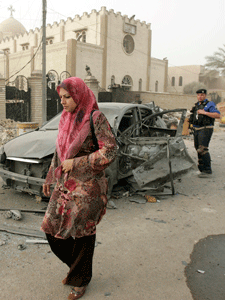An election victory for Iraq’s more secular parties is not tempting Iraqi Christian refugees to return home, even as members of the Chaldean Catholic Church hierarchy continue to express confidence that Christians can live in peace in Iraq.
“It’s...impossible to turn back to Iraq,” Toma Georgees said in his apartment in Damascus, Syria. “Our problem is not with the Iraqi government. Our problem is with Iraqi people…who want to kill us, who want to kill all the Christians.... Those people are ignorant, and they just want to drink our blood as Christians.”
“Iraq is no solution. We cannot return to Iraq,” said Manhal Khoshaba Mikhail, who has spent five years in Beirut, Lebanon, waiting for a chance to resettle in the West.
“If we talk about going back to Iraq, we’re talking about going to hell,” said Hanah Abdel Hahel Salumi, a widow and mother of four in Damascus.
But Louis Sako, the Chaldean archbishop of Kirkuk, Iraq, has said that most Christians who fled to escape death threats and violence during the run-up to the Iraqi elections on March 7 have returned. “The elections were carried out very well. During the campaign period, the political parties debated their programs in a very civilized way,” Archbishop Sako said in late March.
Many refugees who fled during the elections said they have no intention of returning. Many ended up in Damascus or Beirut, Lebanon.
“Impossible, impossible—no way,” said Ameera Yalda Matti, who fled her home near Mosul after barely escaping a bomb attack on her car.
“If Iraq were a free, democratic country, we would not have come here,” said Ihab Ephraim Khodr, who arrived in Beirut within days of the Iraqi vote. Militants had threatened to kill him for selling liquor under the counter at a family business. “Since 2003 there was no authority in Iraq that has found a way of preserving our rights or protecting us.”
“The parties should have looked at Iraq as if we were all Iraqis. This is what was missing,” said Khodr’s wife, Diana Ephraim.
Seven Christian parties vied for five seats reserved for Christians in the 325-seat parliament. With 91 seats and 28 percent of the vote initially, Ayad Allawi’s Iraqiya group appeared to edge out Nouri al-Maliki’s State of Law coalition, which won 89 seats with 27.4 percent of the vote. But court challenges have clouded the election outcome, and it now appears that al-Maliki will have the first chance to form a coalition, even as sporadic violence punctuates the continuing civil uncertainty.
Oussama Safa, a Middle East policy expert, believes Christians can play a meaningful role in Iraq’s sectarian politics. “It’s incumbent on Iraqi Christians to organize themselves and sell themselves as possible coalition partners, coalition pushers or improvers,” said the director of the Beirut-based Lebanese Center for Policy Studies.
Though Safa is optimistic about the prospects for a healthy democracy in Iraq, he acknowledges it would be a long road back to normal civic life for Iraq’s Christians. “There is decidedly a wave to make Iraq unlivable for the Christians,” he said. “What’s happening there is direct violence against the Christian community.... It’s not a political issue there. It’s, you know, blowing up churches and shooting Christians in the streets.”
The Rev. Farid Botros, parish priest at St. Teresa Chaldean Catholic Church in Damascus, said statements from Chaldean Catholic leaders in Iraq encouraging refugees to return are not helping. “They don’t trust in the authority in their country,” Father Botros said. “And they don’t trust in their church. This is very sad.”








